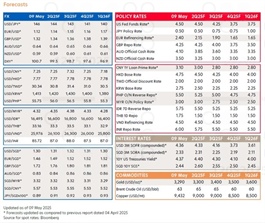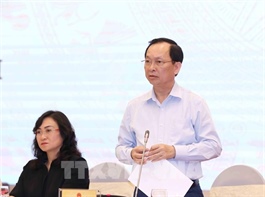Government proposes 2% VAT reduction on select goods and services until 2026
Government proposes 2% VAT reduction on select goods and services until 2026
The proposal, which recommends maintaining this VAT reduction until December 31, 2026, was presented by Minister of Finance Nguyễn Văn Thắng during the ongoing National Assembly (NA) session.

A customer buys petrol at a station in Hà Nội. VNA/VNS Photo Trần Việt |
The Government has proposed a 2 per cent reduction in the value-added tax (VAT) for goods and services currently taxed at 10 per cent, lowering the rate to 8 per cent.
The proposal, which recommends maintaining this VAT reduction until December 31, 2026, was presented by Minister of Finance Nguyễn Văn Thắng during the ongoing National Assembly (NA) session.
The VAT reduction will not apply to sectors including telecommunications, financial services, banking, insurance, securities, real estate, metal products, mining (excluding coal) and items subject to special consumption tax (except for gasoline), according to the proposal.
Additionally, the State has proposed adding gasoline, washing machines, and microwave ovens to the list of goods eligible for the 2 per cent VAT reduction.
Despite gasoline being subject to a special consumption tax and oil being a refined petroleum product, the Government has proposed applying the 2 per cent VAT reduction to these items. This move comes in recognition of the significant role both gasoline and oil play in the economy and daily life.
According to the proposal, gasoline prices directly influence production costs, consumer prices, and overall macroeconomic stability.
Minister of Finance Nguyễn Văn Thắng said that the reduction will contribute to macroeconomic stability despite potential short-term revenue losses. He said the move would encourage business expansion, create jobs, and ultimately result in long-term economic benefits for the country.
The Ministry of Finance has projected that the reduction will lead to a decrease in state revenue by approximately VNĐ121.74 trillion (over US$4.69 billion) over the proposed period. This includes an estimated VNĐ39.54 trillion in the second half of 2025 and VNĐ82.2 trillion in 2026.
The policy is expected to lower the price of goods and services, thereby supporting consumer spending, stimulating consumption, and promoting business and production activities. This, in turn, is anticipated to create jobs, stabilise the macro economy, and drive economic growth.
For consumers, the 2 per cent VAT reduction will help reduce daily living and consumption costs. Meanwhile, businesses stand to benefit from lower product costs, improved competitiveness, expanded markets for consumption and production, and increased job opportunities.
Phan Văn Mãi, Chairman of the National Assembly Committee for Economic and Financial Affairs, said that a majority of National Assembly deputies support the Government’s proposal to expand VAT incentives. They viewed the move as essential to supporting businesses, maintaining macroeconomic stability, and promoting economic growth amid ongoing challenges.
However, Mãi noted that the committee has called on the Government to develop clear and practical measures to address potential complications during implementation, particularly in relation to goods and services excluded from the tax reduction.
The committee also emphasised that the rollout of the policy must be fair, transparent, and convenient for both taxpayers and regulatory authorities, he added.
Meanwhile, NA deputies stressed the need for a more comprehensive assessment of the policy’s impact on state budget revenues. They said the tax cut must align with medium-term fiscal goals, ensure public debt safety, and remain consistent with other tax policies, such as environmental protection and special consumption taxes.
Some deputies also suggested reviewing the list of goods excluded from the VAT reduction, particularly those affected by international trade conflicts and reciprocal tax measures from countries like the US. They said extending support to such sectors could help shield domestic businesses from external economic pressures.
Additionally, there were calls for the Ministry of Finance to consider expanding the VAT cut to cover all goods and services, especially if the revenue difference between included and excluded groups proves minimal. This, they argued, would enhance fairness in the tax system and simplify implementation for both consumers and businesses.
- 07:52 15/05/2025




























